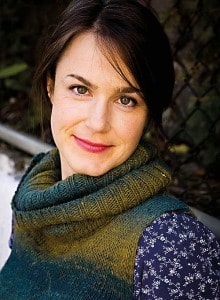On a warm spring evening in New York City, a gaggle of people gathered at Bluestockings, a collectively owned Lower East Side volunteer bookshop with radical vibes, for a panel discussion called “Serious Ladies in Downtown Theater.” Panelists included playwrights Julia Jarcho and Sibyl Kempson, director Alice Reagan and Dixon Place artistic director Ellie Covan. But the belle of the ball that evening was without doubt Jane Bowles, the midcentury American writer whose curious prose and cult status has been influencing writers over the years.
Most recently, Bowles, who died in 1973, has inspired plays by Jarcho (Nomads, which ran in June at the Incubator Arts Project in a production directed by Reagan) and Kempson (Fondly, Collette Richland, which the ensemble Elevator Repair Service will perform in New York City in the fall of 2015). This month Bowles’s more familiar work In the Summer House bows at the Tennessee Williams Theater Festival in Provincetown, Mass., in a production directed by David Kaplan.
Bowles was not unknown during her brief lifetime. Truman Capote called her “a modern legend” and “one of the really original pure stylists,” while Williams declared In the Summer House “a piece of dramatic literature that stands alone, without antecedents and without descendants, unless they spring from the one and only Jane Bowles.” Her complete work, published under the title My Sister’s Hand in Mine: The Collected Works of Jane Bowles, is just shy of 500 pages and includes her novel Two Serious Ladies, In the Summer House (which was performed on Broadway in 1953 to mixed reviews, and revived in 1993 at Lincoln Center Theater in a critically acclaimed production directed by JoAnne Akalaitis) and several short stories and fragments. With her relatively small output, Bowles remains a “writer’s writer.” Throughout the evening at Bluestockings—which offered passionate discourses on why we read Bowles, why her brief and stormy life is fascinating, and what exactly about her writing continues to inspire—people shared tales of their encounters with Bowles, usually prompted by introductions from other interesting writers.
“There is a reason that, in spite of her small oeuvre, generation after generation returns to her novel, her play and her stories,” writes Claire Messud in the introduction to Two Serious Ladies. “For many of us her voice has felt as special, as intimate and cherished, as that of a close and particularly beloved relation.” Indeed, by the end of the Bluestockings evening, Bowles seemed a familiar if unique character, that glamorous aunt from a bygone era haunted by melancholy yet always the life of the party. American Theatre caught up with Jarcho and Kempson to hear more about writing under the influence of Jane Bowles.
Eliza Bent: So we’re gathered today to talk about our girl Jane Bowles.

Sibyl Kempson: Yes, and I’d like to say that I saw Nomads last night, and you know you’ve seen something really great when it alters your way of looking at the world.
Julia Jarcho: It would please me to hear you say more about that.
Kempson: [Laughs] The play evokes a feeling that is very hard to name…which is appropriate, considering Bowles’s work. You feel kind of vindicated and a little bit justified for things that you already have going on, things that don’t have names.

Jarcho: I feel that way about Jane Bowles herself, for sure.
Kempson: I feel that way about your play. I always feel déjà vu reading her. It’s like encountering something from my past, but also from before me—before I came into consciousness. To see it visualized and audio-lized and made manifest aurally—
Jarcho: That’s interesting, because I had no intention of manifesting the world of Jane Bowles in this play. That’s not interesting to me.
Kempson: I wouldn’t think it would be. But I also don’t feel like that’s exactly what I was seeing, either. I’d be interested to hear what your intention was.
Jarcho: At Bluestockings, we talked about how there’s a growing awareness of how many people are just nutty about Bowles. Nomads is a response not just to her work, but the whole set of circumstances in encountering the work—the process of learning about Bowles and dealing with this iconic figure.
For me, her work is perfect. When I do something like an adaptation, it is usually because something bugs me about the source—something is painful to me, or there is a kind of perverse way that I want to interact violently with the source material. I don’t feel that way about Bowles. I feel allied with it, fundamentally. Working on Nomads was about conceiving some kind of venture that would allow me to be with this book, Two Serious Ladies, for a long time.
At Bluestockings, people talked about how Bowles is often treated with a sense of propriety, like, “It’s my secret thing.”
Kempson: She’s the best-kept secret in American literature, in a lot of ways, but that’s part of what makes it so exciting. It’s interesting when two or more writers are working on something at the same time. It means there’s something in the air. So what is it about our time that is bringing Bowles back toward us again? The only thing I can say is that it’s something about women, and the way that women exist that isn’t recognized in literature, aside from what she and Djuna Barnes recognize—
Jarcho: But I feel like Djuna Barnes’s work is romantic, in a way, where Bowles’s work is actually anti-romantic. Bowles is about the meat of longing, as opposed to the vapor of longing in Barnes. There is a mercuriality of romantic failure in her work.
I love the idea that Djuna Barnes is more of a romantic writer, because aren’t Bowles and Barnes considered modernists?
Kempson: I consider modernism to be the reaction against romanticism. Djuna Barnes was one of those women that went to Paris and was like, “Fuck this, we’re gonna do a different thing with it. We’re not gonna be beautiful and in the man’s home, running the home.” Maybe her writing still had a weakness for romanticism, whereas I wouldn’t say Bowles does at all. She’s the farthest thing from it.
Jarcho: To me, modernism is a youthful word that basically means experimentation in the first half of the 20th century.
Kempson: But the scale of warfare in World War I was so unprecedented that it just broke people’s ways of looking at the world. And when World War II happened, art had to change, because the world had changed. People talk about Gertrude Stein like, “Oh, why doesn’t her writing make any sense?” For me, that’s the only way to make sense.
Jarcho: In her essays, Stein talks about the way artists are sort of in tune with what’s happening historically before anyone’s consciousness has caught up with them. The question of why do things come back when they do is interesting.
Brecht has an essay where he talks about how, when we enjoy Shakespearean and ancient plays, perhaps we’re getting so much enjoyment from all these works of other eras because we haven’t found our own proper art yet. Then he presents the idea that we love picking over these carcasses and trying to get any last bit of nourishment from them. I think theatre is just like that, insofar as we’re always reviving and trying to see things again. It’s sort of like necrophilia of theatre.
I love that! Julia, you talked a bit about your allegiance to Bowles and a kind of friendship with her text. Sibyl, what was it that drew you to Bowles?
Kempson: For me, it’s about feeling. I feel like she’s playing my song, you know? Her writing is so compact and efficient and pristine. She also focuses on different stuff than most people would, so you’re forced to relinquish your usual way of experiencing a story. When I first looked at it, I was like, “What the hell is this? How did this even get published?”
Jarcho: I think that part of the adventure of reading Bowles is that her characters are disappointing. They’re disappointing themselves, they’re disappointing each other. You can’t just erase years of reading stories where, essentially, the characters are designed to seduce you. These are some of the only characters ever written, I think, who are not designed to seduce you but to disappoint you, and to interrupt your identification, and to interrupt your hope for them at every point. For a lot of people that’s a challenge in reading it.


